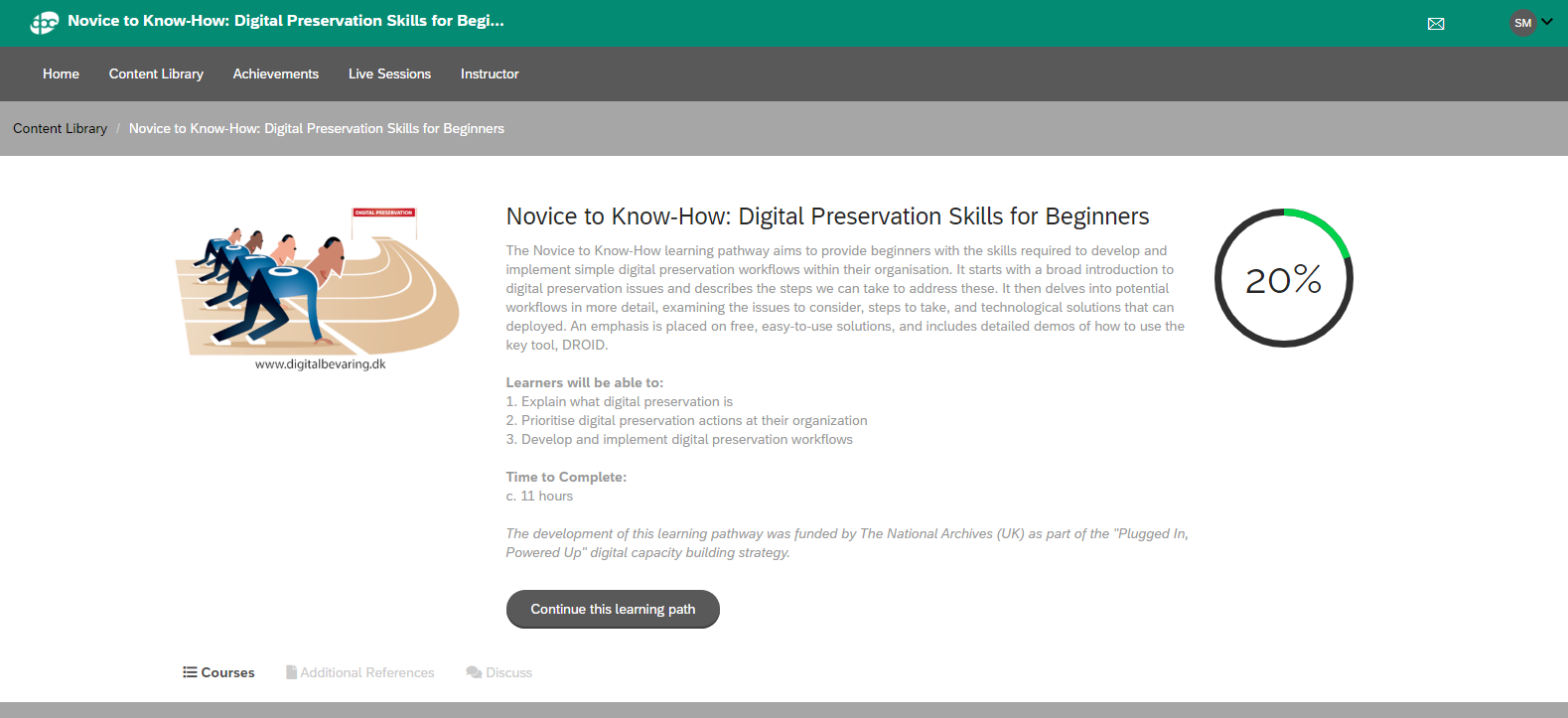Early this year I wrote a blog post introducing our exciting new online training endeavour, funded by The National Archives (UK), Novice to Ninja. A course that aims to provide beginners in digital preservation with the skills to implement simple workflows at their organizations. Four and a half months, 25 modules, around 35,000 words, and a new name (Novice to Know-How) later, today is the last day of the project. To be honest that hasn’t really sunk in yet. Perhaps when the bottle of champagne chilling in the fridge is popped open later, reality will hit!
I won’t lie, it seemed like a Sisyphean task at times, no matter how much time we spent working on the project we never seemed to be that much further on! In fact, I expected to be at maximum stress levels on the last day, furiously working to get things finished. Instead I feel remarkably relaxed: all of the content has been uploaded to the Learning Management System (LMS) and is ready to go. All I have to do is sort out the learner accounts for a soft launch starting tomorrow.

Indeed, I’m so relaxed that I thought I’d write a quick blog post, reflecting on some of the realisations I’ve come to while working on the project. So, let’s start with:
Not all LMS are created equal, but they sure do a lot of the same things.
There are HUNDREDS of LMSs out there, and when you’re starting out it can seem almost impossible to narrow down which will work for you. But we quickly found that there are fundamental things that they pretty much all do, so you need to be smart about what your priorities are. We settled on prioritising budget, ease of use, look and feel, and some specific functionality around course structuring and discoverability. Even then the differences between our top two choices scored very similarly against our requirements, although one edged out the other thanks to great training and support for us as content creators.
Having a good LMS is very important, but finding the right content authoring tool is essential.
One of the biggest worries I had when we started out was how to create content that was engaging and more than just screeds of text, and linked to this, how to successfully capture and publish tool demos. Thankfully, Sarah Middleton found her way to the answer while investigating LMSs. What we needed was a content authoring tool specifically aimed at creating online learning. Some research and recommendations later and we selected a package called Articulate. To say this was a game changer for the project seems like an understatement, procuring and undertaking training in the Articulate tools fundamentally changed how I approached content creation. Hopefully learners will agree for the better! And most magnificently, it makes capturing tool demos SUPER easy.
SCORM sounds like the baddies from a dodgy Sci-Fi show, but it’s really an important standard for interoperability.
I vaguely remember hearing the term SCORM before starting on the project, but I’ll confess to having no idea what it meant. Cue a steep learning curve when we realised this was the key format for uploading content to most LMS. Fundamentally, it is a standard for packaging learning materials to allow easy upload into compatible systems. SCORM-compliance quickly became an important requirement in our search for an LMS, as creating our content in this format would make it easily portable if we wanted to move to a new system or share the content with others.
Planning and preparation really do pay off.
When putting together the project plan we assigned around half the time available to the planning, research, and preparation phases. I wondered at the time if this was wise, perhaps we should really be stacking as much time as possible in the content creation phase? Turns out it was the right way to go. By the time we reached content creation we could hit the ground running, producing the 25 modules in a little under 2 months. It was clear what was needed, and it was easy to get into a “heads down, get it done” headspace.
If you build it, they will come….
Again, when planning the project we put in place specific goals in relation to the pilot phase. We wanted to aim for a pilot cohort of around 20 people from key stakeholder groups, and we had our fingers crossed we’d be able to recruit that many. Turns out we needn’t have worried! We had 109 volunteers in the end, far more than we ever dreamed of. If we needed an indicator of the appetite for this course, here it was. We ended up moving ahead with a pilot cohort of 60 who were asked to provide feedback on 2 of the 6 courses to be developed. Everyone was very enthusiastic, and provided helpful and constructive feedback (15000 words of it!) Every piece of feedback was read and lots of adjustments were made.
Teamwork really does make the dreamwork…
I can’t believe I just typed that! *shudder* But it’s never been more true than here, a great example of the DPC team pulling together and using their diverse skills to deliver to a tough deadline. Thanks go to Sarah Middleton for being Comms Queen and LMS Wrangler, to Amy Currie for being Pilot Shepherd and Analysis Nerd, to Paul Wheatley and Sara Day Thomson for writing 4 of the modules (which made it all seem just that much more doable), Jen Mitcham for being Feedback Guru, and Alyson Campbell, John McMillan, William Kilbride, and Jaye Weatherburn for providing help and support all the times it was desperately needed! Also a big thanks to The National Archives (UK) Sector Development team for giving us the opportunity to work on this project and providing support and guidance throughout. Especially Melinda Haunton and Caroline Catchpole for all their excellent feedback and encouragement!
So, what  happens next? There will be a soft launch starting tomorrow, where the pilot volunteers will get access to the full course, along with some lucky DPC members… The official launch will be coming at the beginning of May, and Sarah Middleton has already had her thinking cap on for another online party. Get your hats ready! Full details will be published about the launch and access to the course closer to the time.
happens next? There will be a soft launch starting tomorrow, where the pilot volunteers will get access to the full course, along with some lucky DPC members… The official launch will be coming at the beginning of May, and Sarah Middleton has already had her thinking cap on for another online party. Get your hats ready! Full details will be published about the launch and access to the course closer to the time.
We’ll also be starting to plan where we can take our online training offer from here. What existing content can we bring online? And what new topics should we cover? A survey will be heading out to DPC members soon to find out more about their priorities. There will also be a proper “lessons learned” report looking in detail at how the Novice to Know-How project went.
If you have any questions about Novice to Know-How, or DPC training in general, please drop me a line. In the meantime, before I figure out how to go back to a normal working schedule, I’m going to head off for some of that aforementioned champagne, and a good few days spent anywhere but in front of a computer (crafts, baking, and jigsaws, ahoy!)
















































































































































